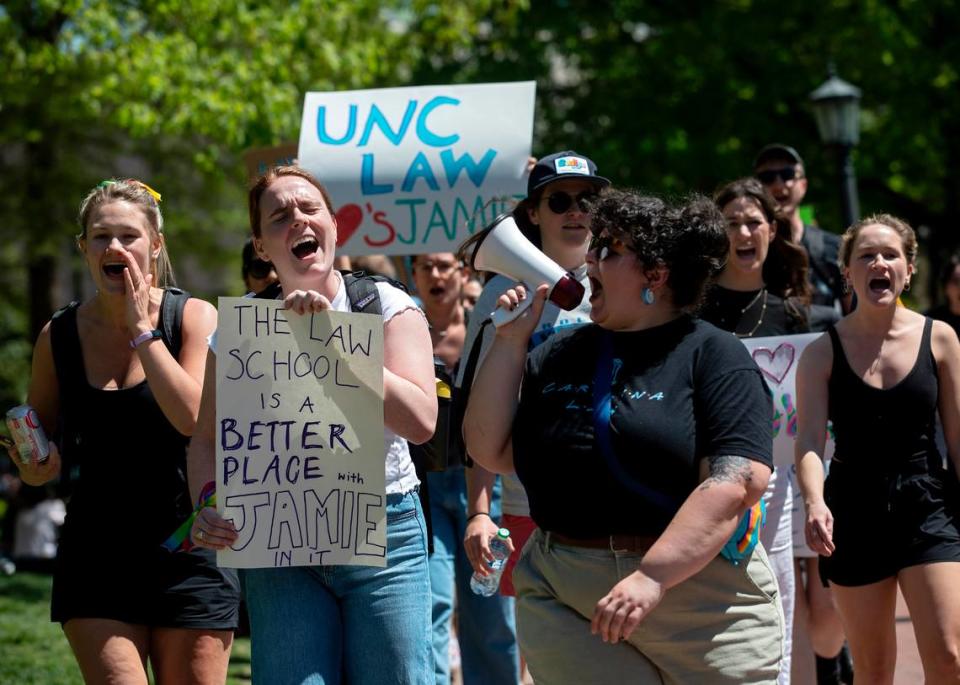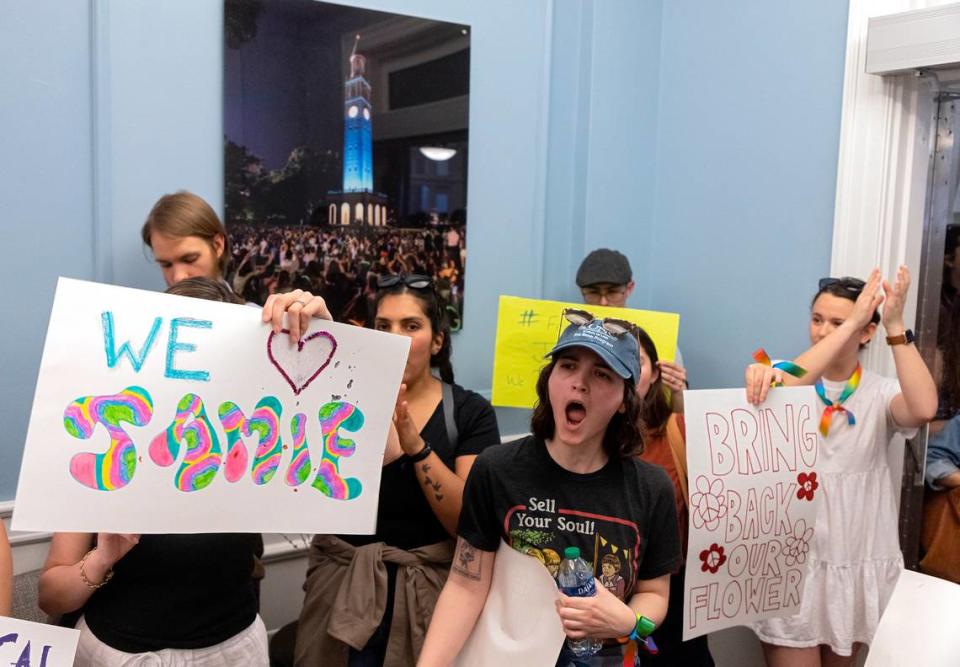UNC Law students protest ban of activist classmate charged with domestic terrorism
More than 100 students and others protested what they say is the ban of a UNC Chapel Hill student and Charlotte activist from campus with a walkout Thursday at the UNC School of Law.
“If Jamie’s not in class, we are not in class,” the coalition chanted while walking under the afternoon sun.
They were en route to the chancellor’s office in the South Building to deliver in-person a letter, signed by hundreds of UNC students, faculty and staff, in support of Jamie Marsicano, a second-year law student who they say was banned from campus.

UNC would not comment on Marsicano’s status or say whether the ban was in place.
Marsicano and 22 others were arrested and charged with domestic terrorism in Georgia after the group breached a proposed police and fire training center in Atlanta on March 5, as previously reported by The Charlotte Observer.
Ban of student from campus
According to Meghan Rankins, a law student and one of the event organizers, Marsicano, who identifies as a white trans femme, received a letter from the university banning Marsicano from going on campus and from taking classes via Zoom.
“The School of Law specifically has been great and wants Jamie to return to class, but the broader university decided that because of this charge that they were going to ban Jamie,” Rankins said.
“We organized this walkout so that the university could physically see the number of people, hundreds of people that support and love Jamie and that she’s dearly missed at class and on campus.”
In addition to the ban, protesters also objected to the charges against Marsicano, said Rankins, who is non-binary.
Marsicano was incarcerated before being granted bond.
“We’re moving now to make sure that Jamie can continue their legal education even while the case is ongoing,” Rankins said.
In the letter sent to the chancellor, the signatories said Marsicano was “not a danger to this campus or our lives” and “instead, their absence has been the greatest disruption to our education that we could have imagined.” Signatories also argued that “presuming guilt before innocence — runs afoul of a primary tenet of our justice system.”

Asked about the ban, university spokesperson Chloe McCotter said the school could not comment on the status of the student or situation due to the Family Educational Rights and Privacy Act.
Asked in a follow-up email what university policy was being used to enforce the ban, she linked online to the policies of a committee tasked with matters of student discipline.
Those policies, among other provisions, lay out that students charged with “a crime of violence” and students “whose behavior makes them a threat” are subject to the committee’s oversight, which may suspend, reinstate, recommend for expulsion and more, depending on the situation.
‘Cop City’
DeKalb County police records show the Georgia Bureau of Investigation arrested Marsicano with a group of protesters who infiltrated the proposed Atlanta Public Safety Training Center — dubbed “Cop City” by its opponents, The Observer reported.
Those arrested are accused of throwing bricks, flaming Molotov cocktails and fireworks at equipment and police, according to the Atlanta Police Department.
Police records also state that protesters destroyed “multiple pieces of construction equipment by fire and vandalism.”
According to multiple news sources, protesters were arrested at the facilities construction site and at a nearby music festival, where concertgoers were gathered to show their solidarity with those protesting the police facility, who say that it will militarize Hispanic and Black communities and raze the area’s forest.
The Associated Press reported that police stormed the festival grounds, a little over an hour after more than 150 masked activists attacked the construction site, and arrested people at the concert. They sought anyone with mud on their clothes, the AP reported.
The proposed $90 million facility will sit on 85 acres of the 400 acres of land owned by the city in DeKalb County and will “support high-quality, community-oriented training for police, fire and E-911 personnel,” according to the Atlanta Police Foundation.
The tract of land lies in the South River Forest southeast of Atlanta, a low-income and predominantly Black part of unincorporated DeKalb County.
The proposed facility, which has been the subject of multiple protests in Georgia, also drew attention after Jan. 18, when police shot and killed Manuel Paez Terán, or “Tortuguita”, an activist who was camping in the forest near the proposed facility.
In Georgia, a domestic terrorism charge can be penalized with five to 35 years of imprisonment.
Who is Jamie Marsicano?
Marsicano has an undergraduate degree from Brown University and worked with The Bail Project, an organization that distributes money to help people in poverty post bail.
Beyond the academics, for many of her classmates and those who knew her, Marsicano had a positive impact on their lives.
“Jamie pushes all of us, every single classmate, to not only learn the law but ask questions as to why the law is. And then Jamie is really, truly impactful as a leader and a mentor,” said Rankins, who said Marsicano had helped another law student avoid eviction and raised hundreds of dollars for another student to get mental health treatment when insurance denied them.
Nicholas Hatcher, a second-year law student and one of the event organizers, said he often finds himself in class turning his head to where Marsicano used to sit.
“There is this kind of void where Jamie used to be,” and “this shouldn’t happen to any student, but Jamie is really an exceptional student.”
Hatcher said his grandmother fell very ill while Marsicano was incarcerated and died soon afterward. Marsicano sent a card and gift even though she had just been released from jail.
Marsicano, in a biography published previously on The Funambulist magazine, used the pronouns she and they, and wrote that they are a “a white trans femme organizer in Charlotte who is fiercely committed to supporting Black trans femmes, prison abolition, and destabilizing all forms of oppression.”
She wrote of being an organizer for the Charlotte Uprising group, which led police brutality protests in 2020, and turning herself in for charges related to protests over George Floyd’s killing by Minnesota police.
She is also the child of powerful Charlotte businessman and philanthropist Michael Marsicano, former CEO of Foundation for the Carolinas.
At the chancellor’s
Hannah Marrion, 28, said she had multiple classes with Marsicano. “Jamie brings an open mindedness and questioning of different ideas that I know has taught me so much in these two classes,” Marrion said.
Marrion said two of the classes she takes with Marsicano are through Duke University School of Law, which has an interinstitutional program, and that Marsicano has not been banned from those.
Duke, a private university, did not respond to questions sent via email as of the time this story was published.
Christi Hurt, chief of staff to Chancellor Kevin Guskiewicz, was handed the letter from protesters.
“Thank you all for coming in,” she said, “I’m grateful for you taking the time. These letters feel, they feel heavy.”
“I’ll make sure these are delivered to the chancellor and the provost and that we take this very seriously.”

